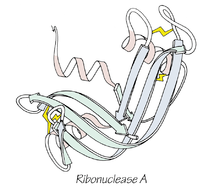Anfinsen's dogma

Anfinsen's dogma (also known as the thermodynamic hypothesis) is a postulate in molecular biology that states that, at least for a small globular protein in its standard physiological environment, the native structure is determined only by the protein's amino acid sequence.[1] The dogma was championed by the Nobel Prize Laureate[2] Christian B. Anfinsen from his research on the folding of ribonuclease A.[3][4] The postulate amounts to saying that, at the environmental conditions (temperature, solvent concentration and composition, etc.) at which folding occurs, the native structure is a unique, stable and kinetically accessible minimum of the free energy. The three conditions:
- Uniqueness: requires that the sequence does not have any other configuration with a comparable free energy. Hence the free energy minimum must be unchallenged.
- Stability: small changes in the surrounding environment cannot give rise to changes in the minimum configuration. This can be pictured as a free energy surface that looks more like a funnel (with the native state in the bottom of it) rather than like a soup plate (with several closely related low-energy states); the free energy surface around the native state must be rather steep and high, in order to provide stability.
- Kinetical accessibility: means that the path in the free energy surface from the unfolded to the folded state must be reasonably smooth or, in other words, that the folding of the chain must not involve highly complex changes in the shape (like knots or other high order conformations).
How the protein reaches this structure is the subject of the field of protein folding, which has a related concept called Levinthal's paradox. The Levinthal paradox states that the number of possible conformations available to a given protein is astronomically large, such that even a small protein of 100 residues would require more time than the universe has existed (1016 seconds) to explore all possible conformations and choose the appropriate one, it would also arguably make computational prediction of protein structures under the same basis unfeasible if not impossible.
Also, some proteins need the assistance of another protein called a chaperone protein to fold properly. It has been suggested that this disproves Anfinsen's dogma. However, the chaperones do not appear to affect the final state of the protein; they seem to work primarily by preventing aggregation of several protein molecules prior to the final folded state of the protein.
Prions are an exception to Anfinsen's dogma. Prions are stable conformations of proteins which differ from the native folding state. In Bovine spongiform encephalopathy (Mad Cow Disease), native proteins re-fold into a different stable conformation, which causes fatal amyloid buildup. Other amyloid diseases, including Alzheimer's disease and Parkinson's disease, are also exceptions to Anfinsen's dogma.[5]
References
- ↑ Anfinsen CB (1973). "Principles that govern the folding of protein chains". Science. 181 (4096): 223–230. doi:10.1126/science.181.4096.223. PMID 4124164.
- ↑ "Press Release: The 1972 Nobel Prize in Chemistry". Nobelprize.org (Press release).
- ↑ White FH (1961). "Regeneration of native secondary and tertiary structures by air oxidation of reduced ribonuclease". J. Biol. Chem. 236: 1353–1360. PMID 13784818.
- ↑ Anfinsen CB, Haber E, Sela M, White FH Jr (1961). "The kinetics of formation of native ribonuclease during oxidation of the reduced polypeptide chain". PNAS. 47 (9): 1309–1314. doi:10.1073/pnas.47.9.1309. PMC 223141. PMID 13683522.
- ↑ "Protein Folding and Misfolding". Yale University Rhoades Lab. Archived from the original on 2012-07-19. Retrieved 2012-08-24.
Further reading
- Sela M, White FH Jr, Anfinsen CB (1957). "Reductive cleavage of disulfide bridges in ribonuclease". Science. 125 (3250): 691–692. doi:10.1126/science.125.3250.691. PMID 13421663.
- Anfinsen CB, Haber E (1961). "Studies on the reduction and re-formation of protein disulfide bonds". J. Biol. Chem. 236: 1361–1363. PMID 13683523.
- Moore S, Stein WH (1973). "Chemical structures of pancreatic ribonuclease and deoxyribonuclease". Science. 180 (4085): 458–464. doi:10.1126/science.180.4085.458. PMID 4573392.
- Profiles in Science: The Christian B. Anfinsen Papers-Articles